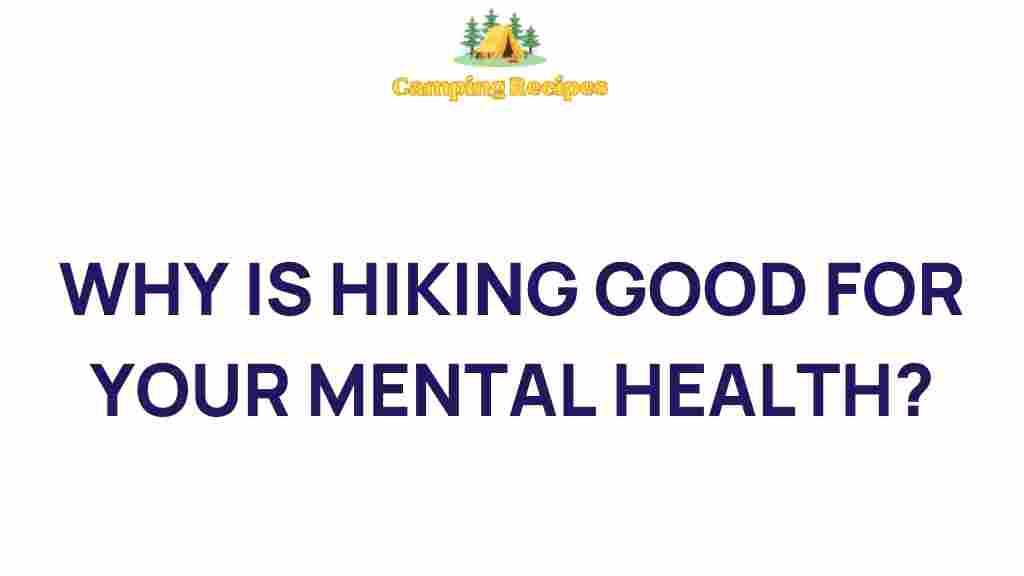Discover the Surprising Benefits of Hiking for Mental Health
Hiking is more than just a physical activity; it is a powerful tool for enhancing mental health and emotional well-being. In today’s fast-paced world, stress relief and emotional balance are crucial for maintaining overall wellness. Engaging in outdoor activities, particularly hiking, offers numerous benefits that contribute to mental clarity and a sense of mindfulness. This article will explore how hiking serves as a form of nature therapy, promoting not only physical wellness but also emotional stability and self-care.
The Connection Between Hiking and Mental Health
Hiking allows individuals to immerse themselves in nature, which is known to have therapeutic effects on the mind. The act of walking through forests, mountains, or trails can significantly reduce feelings of stress and anxiety. Here are some key benefits of hiking for mental health:
- Stress Relief: Spending time in nature reduces cortisol levels, the hormone associated with stress.
- Improved Mood: Physical activity releases endorphins, which can help improve mood and decrease feelings of depression.
- Enhanced Mindfulness: Hiking encourages individuals to be present in the moment, fostering a sense of mindfulness.
- Increased Creativity: Nature has a way of stimulating creativity, offering new perspectives and ideas.
- Social Interaction: Hiking can be a social activity, allowing for bonding experiences with friends and family.
The Science Behind Nature Therapy
Research has shown that nature therapy, which includes activities like hiking, has profound effects on mental health. Studies indicate that spending time in natural environments can:
- Reduce symptoms of anxiety and depression.
- Improve overall emotional balance.
- Enhance cognitive function and focus.
One study published in the National Institutes of Health journal found that participants who walked in natural settings reported lower levels of rumination, a common factor in anxiety and depression.
How to Get Started with Hiking for Mental Health
If you’re new to hiking or looking to incorporate it into your self-care routine, follow these steps to maximize your experience:
1. Choose Your Trail Wisely
Select a hiking trail that suits your fitness level. Whether you’re a beginner or an experienced hiker, there are plenty of options available. Consider the following:
- **Difficulty level**: Start with easy trails if you’re new.
- **Duration**: Plan for shorter hikes initially, gradually increasing the length.
- **Scenery**: Look for trails that offer beautiful scenery to enhance your experience.
2. Prepare for Your Hike
Preparation is key to enjoying your hiking experience. Here are some tips:
- **Dress appropriately**: Wear comfortable clothing and sturdy shoes suitable for hiking.
- **Pack essentials**: Bring water, snacks, a first-aid kit, and a map of the area.
- **Check the weather**: Make sure to choose a day with favorable weather conditions.
3. Practice Mindfulness While Hiking
As you hike, practice mindfulness techniques to enhance your mental health benefits:
- **Focus on your breath**: Take deep breaths as you walk.
- **Engage your senses**: Notice the sights, sounds, and smells of nature around you.
- **Be present**: Let go of distractions and immerse yourself in the experience.
4. Reflect on Your Experience
After your hike, take some time to reflect on how you feel:
- **Journal your thoughts**: Write down your feelings and observations.
- **Share with others**: Discuss your experience with friends or fellow hikers.
Potential Challenges and Troubleshooting Tips
While hiking can be an enjoyable activity, it may come with its own set of challenges. Here are some common issues and how to address them:
1. Physical Discomfort
It’s common to experience soreness or fatigue, especially if you’re new to hiking. To alleviate discomfort:
- **Start slow**: Gradually increase your hiking distance and intensity.
- **Stretch before and after**: Incorporate stretching exercises to prevent stiffness.
2. Weather Conditions
Unpredictable weather can affect your hiking plans. To prepare:
- **Check forecasts**: Always review the weather before heading out.
- **Dress in layers**: Wear clothing that can be adjusted according to temperature changes.
3. Safety Concerns
Safety should always be a priority when hiking. Here are some safety tips:
- **Stay on marked trails**: Avoid wandering off established paths.
- **Hike with a buddy**: If possible, never hike alone.
- **Inform someone**: Let someone know your hiking route and expected return time.
Incorporating Hiking into Your Self-Care Routine
To truly benefit from hiking as part of your self-care routine, consider the following strategies:
- Set a regular schedule: Aim to hike at least once a week to establish a routine.
- Explore new locations: Discover different trails to keep your hiking experience fresh and exciting.
- Join a hiking group: Connect with others who share your interest in outdoor activities.
Hiking can be a transformative experience for your mental health. By integrating it into your self-care practices, you can cultivate emotional balance and enhance your overall well-being.
Conclusion
Hiking is a simple yet effective way to boost mental health, offering benefits such as stress relief, emotional balance, and enhanced mindfulness. By spending time in nature and engaging in outdoor activities, you can experience physical wellness and improve your overall quality of life. Remember, the journey of hiking is not just about the destination; it’s about the healing power of nature and the self-care it provides. So lace up your hiking boots, hit the trails, and discover the surprising benefits that await you.
For more tips on mental health and outdoor activities, check out our comprehensive guide on wellness practices.
This article is in the category Adventure and created by CampingRecipes Team
